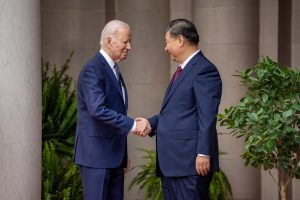When U.S. President Joe Biden and Chinese President Xi Jinping met in California this month, the Indian diplomatic establishment would likely have been watching proceedings with some anxiety.
Over the last several months, as India and the United States have strengthened their strategic partnership, the threat of China has served to unite them over myriad differences. Washington has overlooked New Delhi’s neutrality over Ukraine, its ties with Russia, and concerns over democratic backsliding and human rights, largely owing to the shared need to counterbalance China. If the U.S. and China began to patch things up, that shared interest might begin to get tested.
To be sure, the talks between Biden and Xi were not expected to yield enough to change the course of the China-U.S. relationship — and they didn’t. Yet, the fact that the meeting even took place was immensely significant for both India and the world. The two leaders were meeting after several months of frost, generated through visits by U.S. leaders to Taiwan, Xi’s steadfast support for Russia’s President Vladimir Putin, the alleged Chinese spy balloon that flew over North America this year, and continued militarization in the South China Sea.
Through many of those events, communications between the United States and China appeared to break down repeatedly. The key objective of this month’s meeting, therefore, was to find a way to start talking again, and to that extent, Biden and Xi were successful. The two countries agreed to resume military-level communications and signed a deal to control the flow of a dangerous opioid drug into the United States. Xi also had an audience with the U.S. business community in an attempt to lure back investors.
New Delhi might understandably see some concern in these developments. Biden’s sudden outreach to Xi could be seen, in some ways, as an effort by Washington not just to lower the temperature on a dangerous geopolitical rivalry but also to increase the United States’ strategic space. Despite sundry differences with India, for as long as the U.S. is engaged in an effort to contain China, Washington might feel compelled to yield leverage to New Delhi and overlook problems in the relationship. That logic also applies to Washington’s courtship of the Philippines, Vietnam, and other important illiberal allies in Asia.
These dynamics appeared to play out not long after Biden’s meeting with Xi. In a strange coincidence, a week after that meeting, reports began to suggest that U.S. authorities suspected Indian involvement in another attempted extrajudicial killing of a Sikh separatist leader — this time in the United States. The Biden administration later confirmed those reports and said that it had raised the issue with India “at the senior-most levels.”
While Xi’s meeting with the U.S. business community did not appear to be immediately successful, it too may be an ominous sign. Over the last several months, as U.S. investors have looked to pivot away from China, India has sought to carve out a space of its own to welcome them. That effort has not always been successful. According to some estimates, the export base cleared out by China’s slowing growth has been taken up by countries such as Vietnam, leaving India with few gains so far. But if Xi is able to persuade American investors by establishing a genuine thaw with Washington in the year ahead, that space may end up even more constrained.
Yet, despite these threats, India should also see reason for relief in Biden’s attempted rapprochement with Xi. For one, like most other countries in Asia, India needs the U.S. and China to talk to each other, even if only to prevent a crisis from blowing up. During the spy balloon incident this year, communications between the two world powers broke down entirely, threatening to devolve into a much larger crisis.
An unlikely thaw between China and the U.S. may also make the Quad less intolerable to Beijing and reduce pressure on India to militarize that coalition. Perhaps even more importantly, Biden’s engagement with Xi may preempt an invasion of Taiwan by Chinese forces — a conflict that could have serious economic and strategic repercussions for India.
For much of the past year, India and the United States have made China a major factor in bringing themselves together. In that context, a thaw of any kind between Beijing and Washington might make New Delhi wary. But in fact, New Delhi should welcome such a development and seek to take its relationship with the United States beyond China.

































